
IN CONTEXT
Idealism
Human consciousness
350 BCE Aristotle claims that slavery is natural because some people are natural leaders, while some are subservient.
1649 French philosopher René Descartes argues that you cannot deny your mind’s existence at the same time as using your mind to do the denying.
1840s Karl Marx uses Hegel’s dialectic method in his analysis of the class struggle.
1883 Friedrich Nietzsche creates his image of the Übermensch (overman) who trusts his own intuitive sense of what is good and evil.
The German philosopher Georg Hegel’s great work The Phenomenology of Mind (or “Spirit”) appears at first to have little to do with politics, since it deals with difficult and abstract arguments about the nature of human consciousness. However, his conclusions regarding the way we reach a state of self-awareness have profound implications for the way society is organized, and pose difficult questions concerning the nature of human relations.
Hegel’s philosophy is focused on how the thinking mind views the world. He wants to understand how each human consciousness creates its own worldview. Crucial to his argument is his emphasis on self-consciousness. For Hegel, the human mind, or spirit, desires recognition, and indeed needs that recognition in order to achieve self-awareness. This is why human consciousness, for Hegel, is a social, interactive process. It is possible to live in isolation without being fully aware, Hegel believes. But for the mind to fully exist—to be free—it must be self-conscious, and it can only become self-conscious by seeing another consciousness react to it.
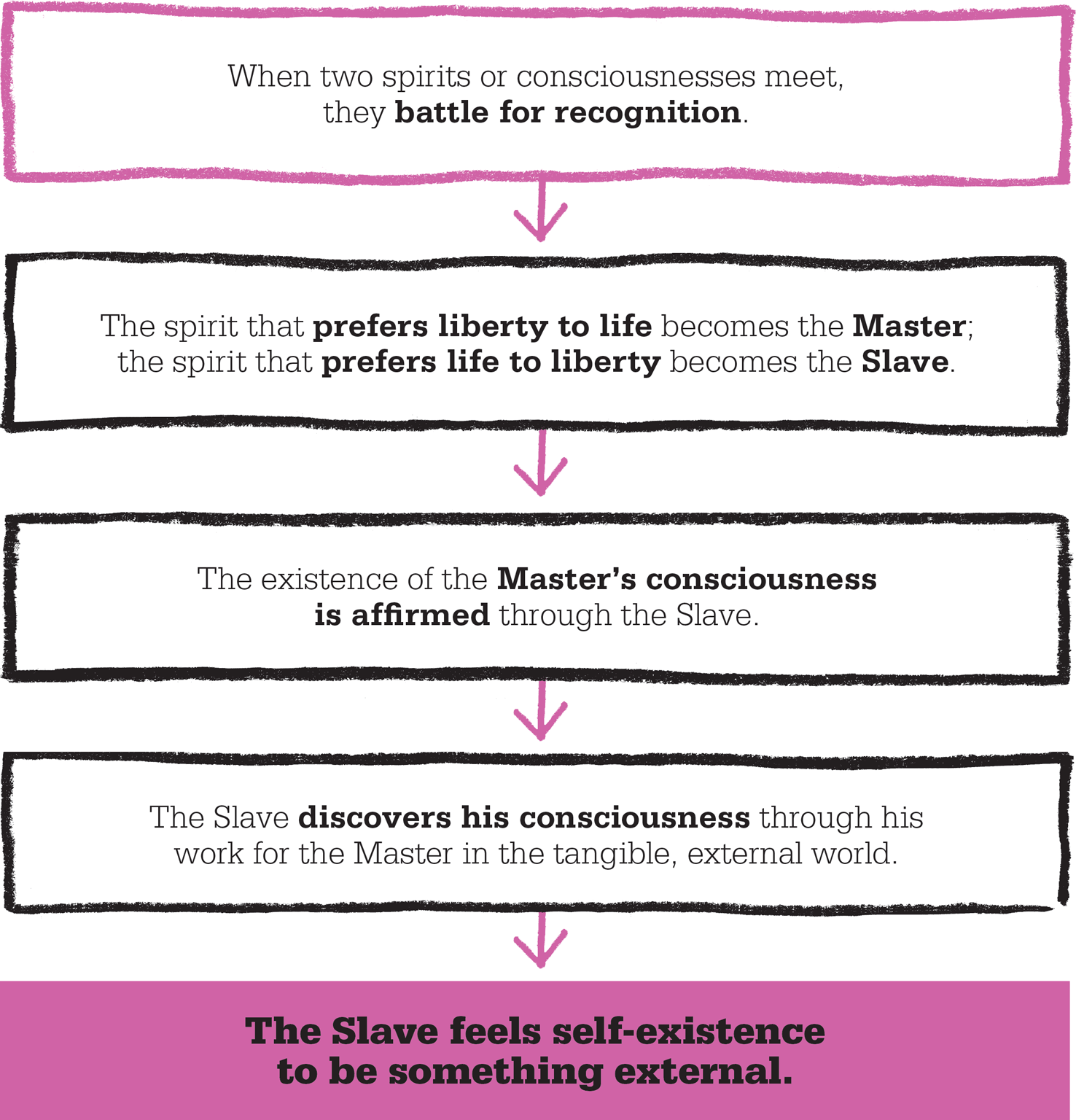
Master–Slave
According to Hegel, when two minds meet, what matters to both is being recognized: receiving from the other the confirmation of their own existence. However, there is only room for one worldview in the mind of each individual, so a struggle ensues about who is going to acknowledge whom—whose worldview is to triumph. Hegel describes how each mind must try to kill the other. The problem is, though, that if one destroys the other, the loser will no longer be able to give the affirmation the winner needs. The way out of this dilemma is a Master–Slave relationship, in which one person “gives in” to the other. The one who values liberty more than life becomes Master; the one who values life more than liberty becomes Slave. This relationship evolves not only in literal master and slave situations, but in any situation where two minds meet.
Hegel appears to be implying that slaves are only slaves because they prefer to submit rather than die, and they collude with their masters. He wrote, “It is solely by risking life that freedom is obtained.” He asserts that terror of death is the cause of oppression throughout history, and at the root of slavery and class distinction. He admired Napoleon for this reason and praised his willingness to risk his own life in order to achieve his aims. Hegel is suggesting that slavery is primarily a state of mind, which finds echoes in the later case of escaped American slave Frederick Douglass (1818–1890). Dragged back to his master, Douglass decided to stand up and fight, even if it might mean death, and afterward wrote, “However long I might remain a slave in form, the day had passed forever when I could be a slave in fact.”
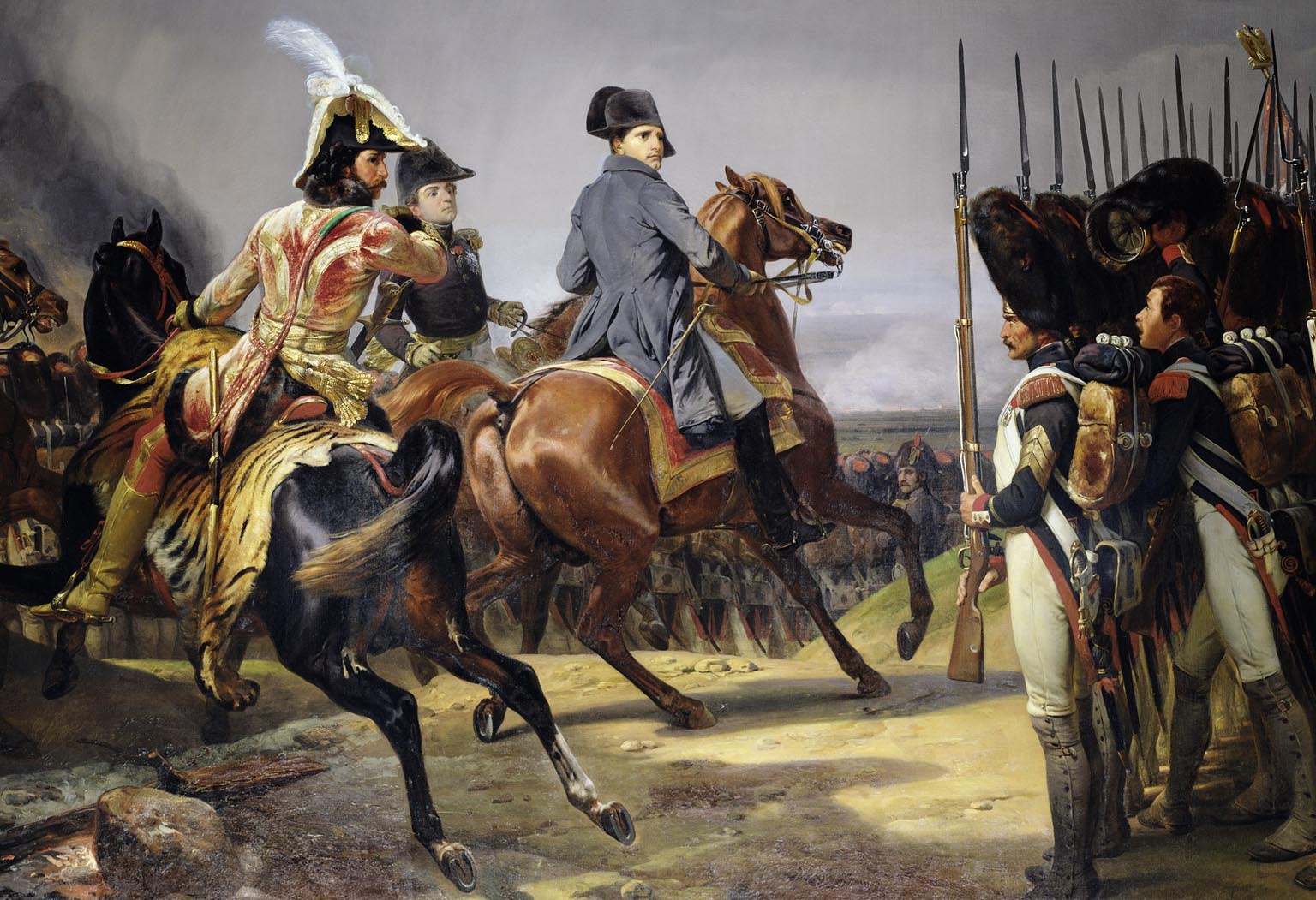
Napoleon Bonaparte‘s vision for a new order and courage in battle made him a man “whom it is impossible not to admire,” said Hegel, who respected Napoleon’s qualities as a “Master.”
Dialectical relationship
Today, the choice between death and slavery seems an unacceptable one to have to make. But it may be that Hegel’s arguments about the Master–Slave relationship are much less literal, and far more subtle and complex. He suggests ways in which the Slave might in fact benefit more from the relationship than the Master. He describes the development of their relationship as a dialectic. By this he means a particular kind of argument that begins with a thesis (the minds) and its antithesis (the result of the encounter between minds), which together produce a synthesis (the resolution into Master and Slave). This dialectic is not necessarily a description of a real struggle between a slaveholder and slave. Hegel is talking about a struggle for domination between minds—and there is no room in his conception for cooperation: there must be a resolution into Master and Slave. He goes on to show how the relationship develops further. The synthesis seems to confirm the existence of the Master’s mind. At first, everything appears to revolve around him and his ability to get the Slave to serve his needs confirms his own freedom and self-consciousness. The Slave’s independent self-consciousness, meanwhile, is totally dissolved. However, at this point another dialectic relationship develops.
Since the Master does nothing, he relies on the Slave to affirm his existence and freedom. He is, in fact, in a dependent relationship with the Slave, which means that he is anything but free. The Slave, however, is working with real things—with nature—even if only for his Master. This reaffirms his existence in a tangible, external way that the idle Master cannot hope to emulate: “In [his work for] the Master, the Slave feels self-existence to be something external, an objective fact.” In making things, and making things happen, “self-existence comes to be felt explicitly, as his own proper being, and [the Slave] attains the consciousness that he himself exists in his own right.” So now their situations become inverted—the Master disappears as an independent mind, while the Slave emerges as one. Ultimately, for Hegel, the Master–Slave dialectic may be more harmful to the Master than it is to the Slave.
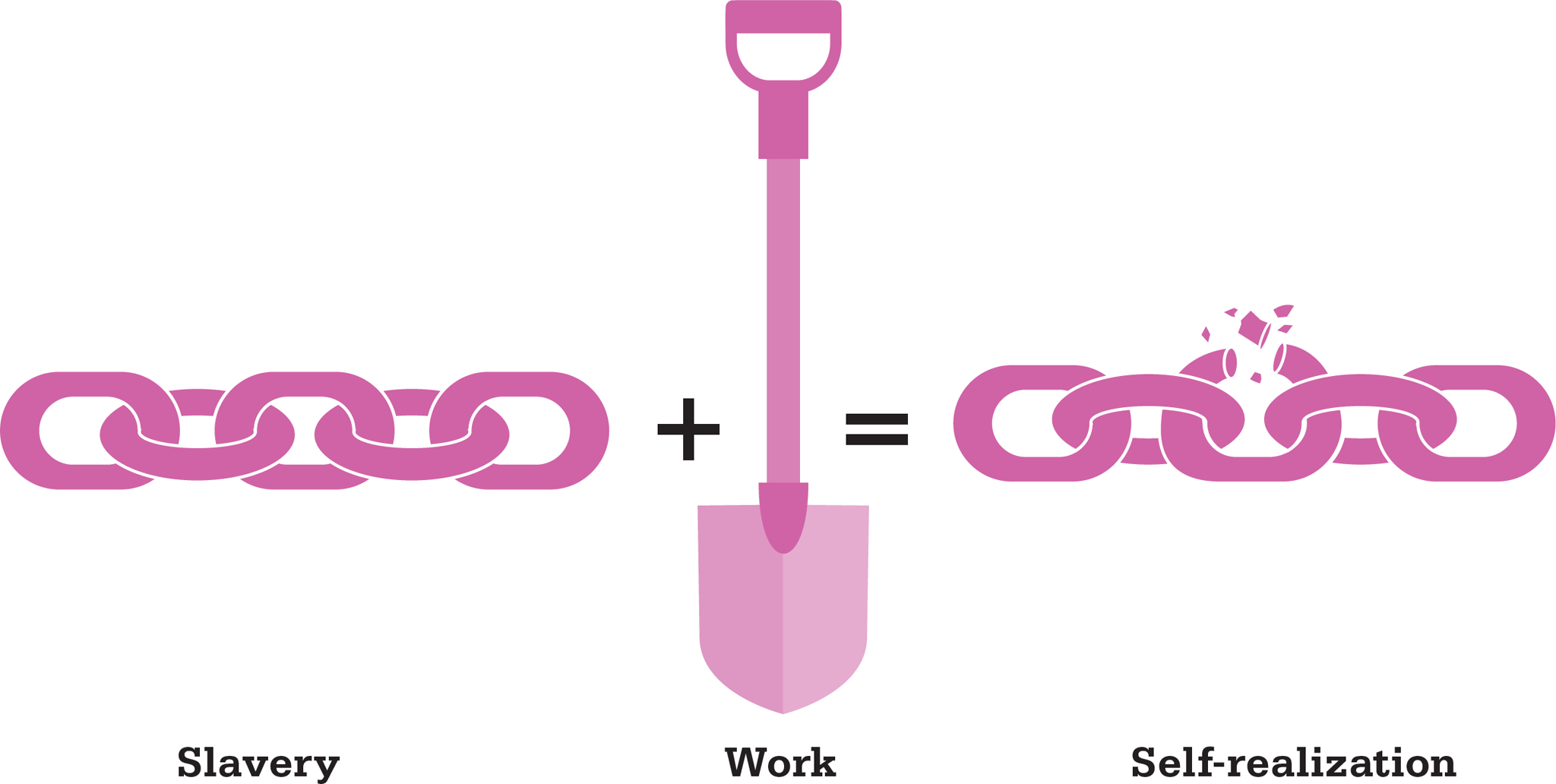
Hegel asserted that a Slave, while engaged in tangible work, would come to experience a realization of his own existence (and therefore become “free”) in a way that his Master would not.
Slave ideologies
So what happens when the Slave reaches this new kind of self-realization, yet is not ready for a fight to the death? At this point, Hegel argues, the Slave finds “slave ideologies” that justify his position, including stoicism (in which he rejects external freedom for mental freedom), skepticism (in which he doubts the value of external freedom), and unhappy consciousness (in which he finds religion and escape, but only in another world).
"If a man is a slave, his own will is responsible for his slavery… the wrong of slavery lies at the door not of enslavers or conquerors but of the slaves and conquered themselves."
Georg Hegel
Hegel finds these Master–Slave relationships in many places—in the wars between stronger states and weaker states, and conflicts between social classes and other groupings. For Hegel, human existence is an endless fight to the death for recognition, and this fight can never properly be resolved.
Hegel’s influence
Karl Marx was strongly influenced by Hegel’s ideas, and adopted his idea of the dialectic, but found Hegel too abstract and mystical in his concentration on consciousness. Instead, Marx chose a materialist approach. Some find Hegel’s argument that only fear keeps people enslaved inspirational; others consider his insistence that submission is a choice is a case of blaming the victim and does not relate well to the real world, in which power relations are complex. Hegel remains one of the hardest political philosophers to understand, and one of the most controversial.
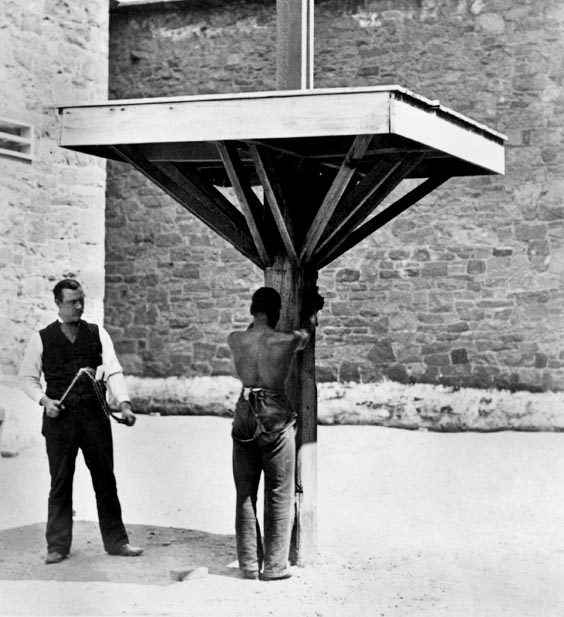
A slave, about to be whipped by his master could be to blame for his position, following Hegel’s logic. Critics of Hegel argue that this position is clearly unjust.
GEORG HEGEL
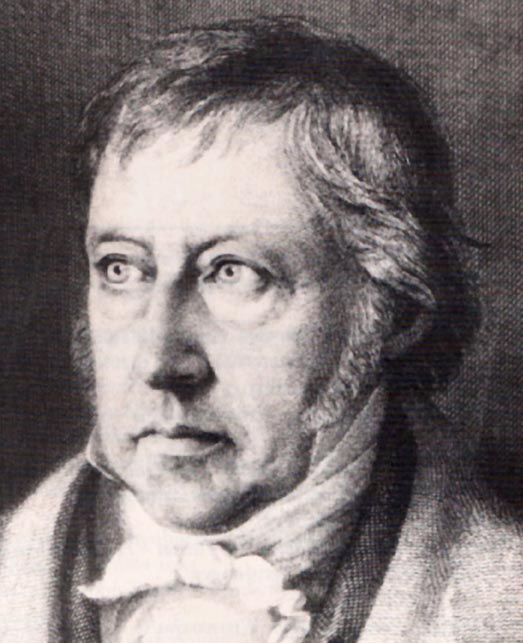
Georg Hegel was born in Stuttgart in the German Duchy of Württemberg. Much of his life was lived in the calm of Protestant southern Germany, but against the backdrop of the French Revolution. He was a student at Tübingen University at the height of the Revolution and he encountered Napoleon at Jena, where he completed The Phenomenology of Mind.
After eight years as rector at the Gymnasium in Nuremberg, he married Marie von Tucher and worked on his great book on logic. In 1816, after the early death of his wife, he moved to Heidelberg, and many of his ideas are contained in notes from the lectures he gave to philosophy students there. He died in 1831 after returning to Berlin during a cholera epidemic. Perhaps appropriately for such a complex thinker, it is said that his last words were “And he didn’t understand me.”
Key works
1807 The Phenomenology of Mind
1812–16 The Science of Logic
1821 The Philosophy of Right
See also: Aristotle • Hugo Grotius • Jean-Jacques Rousseau • Karl Marx • Friedrich Nietzsche
